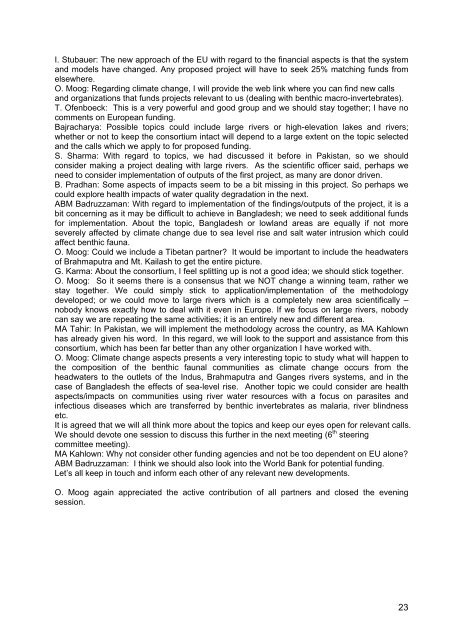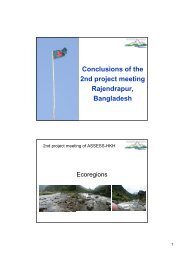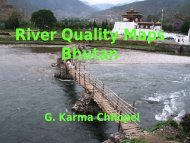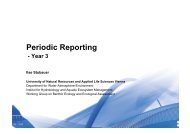2007 - ASSESS-HKH
2007 - ASSESS-HKH
2007 - ASSESS-HKH
You also want an ePaper? Increase the reach of your titles
YUMPU automatically turns print PDFs into web optimized ePapers that Google loves.
I. Stubauer: The new approach of the EU with regard to the financial aspects is that the system<br />
and models have changed. Any proposed project will have to seek 25% matching funds from<br />
elsewhere.<br />
O. Moog: Regarding climate change, I will provide the web link where you can find new calls<br />
and organizations that funds projects relevant to us (dealing with benthic macro-invertebrates).<br />
T. Ofenboeck: This is a very powerful and good group and we should stay together; I have no<br />
comments on European funding.<br />
Bajracharya: Possible topics could include large rivers or high-elevation lakes and rivers;<br />
whether or not to keep the consortium intact will depend to a large extent on the topic selected<br />
and the calls which we apply to for proposed funding.<br />
S. Sharma: With regard to topics, we had discussed it before in Pakistan, so we should<br />
consider making a project dealing with large rivers. As the scientific officer said, perhaps we<br />
need to consider implementation of outputs of the first project, as many are donor driven.<br />
B. Pradhan: Some aspects of impacts seem to be a bit missing in this project. So perhaps we<br />
could explore health impacts of water quality degradation in the next.<br />
ABM Badruzzaman: With regard to implementation of the findings/outputs of the project, it is a<br />
bit concerning as it may be difficult to achieve in Bangladesh; we need to seek additional funds<br />
for implementation. About the topic, Bangladesh or lowland areas are equally if not more<br />
severely affected by climate change due to sea level rise and salt water intrusion which could<br />
affect benthic fauna.<br />
O. Moog: Could we include a Tibetan partner It would be important to include the headwaters<br />
of Brahmaputra and Mt. Kailash to get the entire picture.<br />
G. Karma: About the consortium, I feel splitting up is not a good idea; we should stick together.<br />
O. Moog: So it seems there is a consensus that we NOT change a winning team, rather we<br />
stay together. We could simply stick to application/implementation of the methodology<br />
developed; or we could move to large rivers which is a completely new area scientifically –<br />
nobody knows exactly how to deal with it even in Europe. If we focus on large rivers, nobody<br />
can say we are repeating the same activities; it is an entirely new and different area.<br />
MA Tahir: In Pakistan, we will implement the methodology across the country, as MA Kahlown<br />
has already given his word. In this regard, we will look to the support and assistance from this<br />
consortium, which has been far better than any other organization I have worked with.<br />
O. Moog: Climate change aspects presents a very interesting topic to study what will happen to<br />
the composition of the benthic faunal communities as climate change occurs from the<br />
headwaters to the outlets of the Indus, Brahmaputra and Ganges rivers systems, and in the<br />
case of Bangladesh the effects of sea-level rise. Another topic we could consider are health<br />
aspects/impacts on communities using river water resources with a focus on parasites and<br />
infectious diseases which are transferred by benthic invertebrates as malaria, river blindness<br />
etc.<br />
It is agreed that we will all think more about the topics and keep our eyes open for relevant calls.<br />
We should devote one session to discuss this further in the next meeting (6 th steering<br />
committee meeting).<br />
MA Kahlown: Why not consider other funding agencies and not be too dependent on EU alone<br />
ABM Badruzzaman: I think we should also look into the World Bank for potential funding.<br />
Let’s all keep in touch and inform each other of any relevant new developments.<br />
O. Moog again appreciated the active contribution of all partners and closed the evening<br />
session.<br />
23






